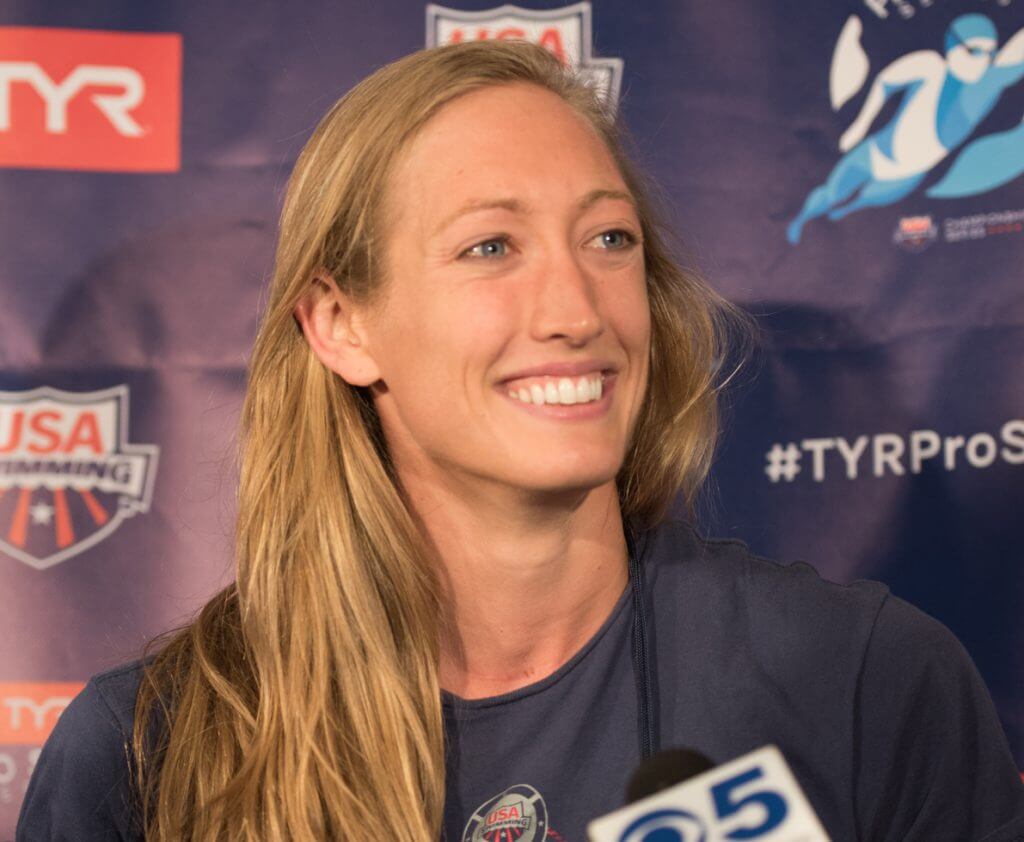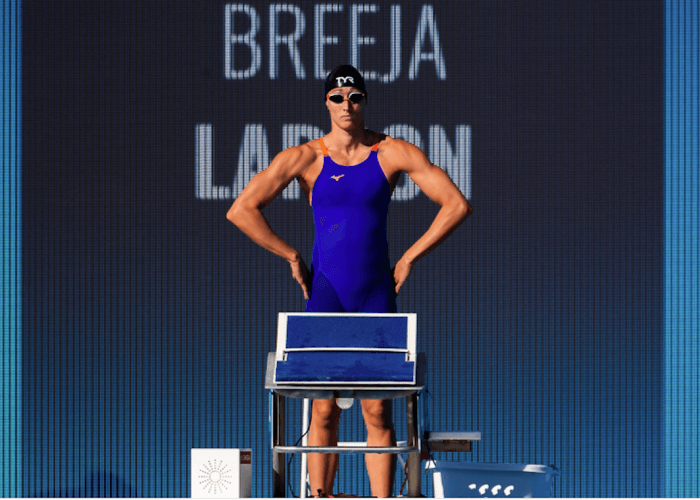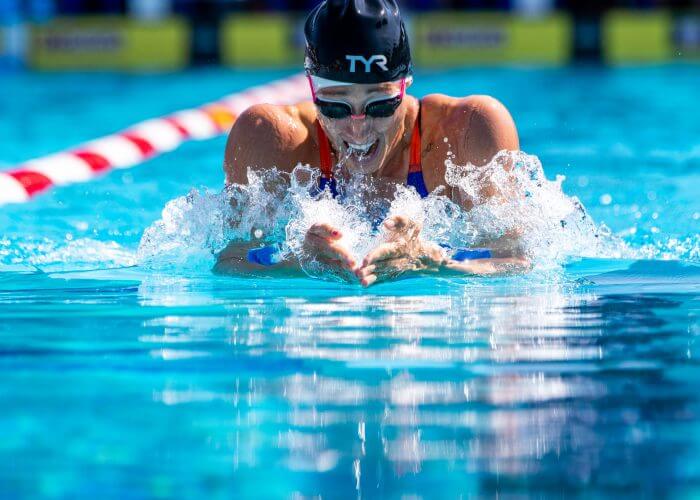Breeja Larson Announces Retirement From Swimming With ‘Feeling of Peace’

Breeja Larson was hoping to put in a solid year of training with Bob Bowman and build some momentum heading into Olympic Trials as a contender.
But the COVID-19 pandemic changed everything.
Larson was not able to join Bowman’s group, trained on her own for several months before the International Swimming League (ISL) season and made the decision that she wasn’t going to be ready for the trials.
With this Olympic year likely the end of the road for Larson, she announced her retirement from swimming.
“I just kept having this feeling of peace when I thought about being done,” Breeja Larson told Swimming World. “I had been training up to the ISL by myself. It was getting really tough. The ISL was not a great racing experience for me. I was pretty disappointed that I wasn’t able to stay in the right shape by myself. I had this intense moment of stress on what to do with all that I looked into. Then I had a moment where I thought about retirement and I had so much peace. I was looking forward to things I was doing outside of the water. I wish I had the resources to keep training, but I think my heart was pulling me to retire.”
Larson, 29 made the U.S. Olympic team in 2012 in the 100 breaststroke. She won gold in 2012 on the medley relay and was sixth in the 100 breast in London. She won the national title in both breaststroke events in 2013 as well. During her career at Texas A&M she won three consecutive NCAA championships in the 100 breast. In 2016, she finished fourth at trials, just missing the team.

Breeja Larson. Photo Courtesy: Connor Trimble
“London was a lot of ignorant confidence. I didn’t know a lot about other swimmers and I didn’t fully comprehend how long others had been swimming. It was a blast,” she said.
Her last big performance was winning the 100 breaststroke at the 2019 U.S. National Championships in Palo Alto, touching the wall in 1:06.78.
“It’s a big one, honestly,” Larson said after that race. “I really, really struggled in 2016. It means a lot. It has been really scary coming back. I think a lot of pros continue swimming and are not sure what is going to happen. You start to wonder when you get a little older, ‘Am I wasting my time? Should I start a career?’ It is a little scary but you have to find that hunger within you. Working the mental part of the sport is a lot more important than the younger kids know. When we get older, we see that a little more clearly.”
That all came after six months out of the water the year prior as she was trying to figure out whether to concentrate on swimming full time, give it up to work full time, or something in the middle.
Larson wasn’t done with swimming and came back to claim the national title.
So the time out of the water wasn’t as intimidating to Larson as it was to other swimmers during the pandemic because she had experienced that before.
“I really felt it was my calling. After all I have been through, maybe it forced me to take a break, just to come back with a fresh mind and really appreciate (swimming again),” Larson said in 2019.
Out of the water, Larson has been a speaker for youth swimmers as well as adult groups. She has worked with Airbnb and spoke to many groups about how to build a champion mindset, dealing with the highs of winning and the lows of losing, as Larson experienced by not making the Olympic team in 2016.
“Everyone was robbed of trials the first time. I felt pretty robbed in November and December. But as time has gone one I really have felt happy and peace with everything. You don’t have to be defined by your goal. Then I started finding my footing outside of the swimming world, Larson said. “Speaking engagements are going really well honestly. I have been working with big companies and mentoring.
I have worked with Airbnb, CapitalOne, Uber and a bunch of other big companies. We are putting together a pro camp with swimmers to go international. I got my real estate license with Launch Real Estate and I have been able to do all of this and network from every angle.”
Rather than be tied to one job or in one avenue, Larson is looking forward to continuing to spread things out.
“I love the gig-based employment. It raises a constant challenge and is really similar to the principles you use in swimming. You have to have a plan every day and attack your goals in the same way,” she said. “I am really going to miss being in extremely good shape — and of course the people. The people the travel, eating whatever I wanted.”
Larson reflected on some of the defining moments of her career.
“Having the opportunity to swim with Steve Bultman as my coach absolutely changed my life. Making the Olympic team brought me the confidence that through hard work, incredible things can happen. Being able to meet phenomenal athletes and public and political figures has taught me that everyone is human. We are either driven by the fear of failure or fear of success, which can be crippling.”

Breeja Larson. Photo Courtesy: Connor Trimble
But it is how she responded when things didn’t go as planned that will define Larson’s legacy.
“I have done a lot of research on athlete failures. Watching and meeting so many phenomenal athletes I have understood their mindset is the same as powerful executives. Getting to learn how people’s mindsets work has helped me catapult my career into another direction,” Breeja Larson said. “The importance of looking at the big picture for swimmers still in the game and learning how to be financially literate is huge. That is the one thing I did right in my career. I latched on to older Olympians and they were an inspiration to me in regard to how to survive as a swimmer financially. It is so important to invest in yourself as soon as you start making money. It makes me concerned when I see young swimmers not know what to do with their resources. In 2016, I missed the Olympic team and got fourth place. I thought my value plummeted to zero and I was crushed. That was in my own dark mind at the time. I remember watching the 50 free from the stands and somehow, the way they moved their legs and arms determined their value and that was so silly to me. That is when I started to figure it out.”
Now, she is figuring out how those lessons and values will translate into her post-swimming career.
“I have been swimming ‘one more year’ for about four years. I found a lot of really great side hustles which turned into a really great gig economy career,” she said. “That was the biggest defining moment for my speaking career. I found value growing through the painful moments. ‘This pain is my privilege’ was a quote from Arnold Schwartzenegger. I found more value in myself after not making the Olympic team. The really painful moments help us grow the most.”
Breeja Larson’s career in photos:
This slideshow requires JavaScript.



